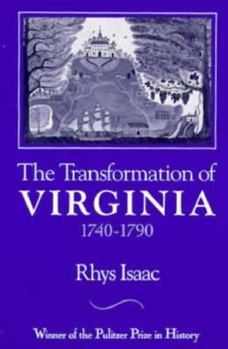The Transformation of Virginia, 1740-1790
Select Format
Select Condition 
Book Overview
In this Pulitzer Prize-winning book, Rhys Isaac describes and analyzes the dramatic confrontations--primarily religious and political--that transformed Virginia in the second half of the eighteenth... This description may be from another edition of this product.
Format:Paperback
Language:English
ISBN:0393956938
ISBN13:9780393956931
Release Date:January 1988
Publisher:W. W. Norton & Company
Length:486 Pages
Weight:1.35 lbs.
Dimensions:1.4" x 5.5" x 8.2"
Customer Reviews
5 ratings
A riveting account of a double revolution in early America
Published by Thriftbooks.com User , 16 years ago
Eighteenth-century Virginian gentry had established a society, complete with imported styles and articles of British dress and life, which set them a part from commoners, but, which never quite equaled life in England. Within 50 years, more egalitarian religious upsurges and a political revolution challenged the great-family society and altered its social functioning. Rhys Isaac's The Transformation of Virginia ,1740-1790, chronicles and analyzes the legal, religious, and cultural battles for societal control between members of the Virginian plantation elites and those popularizing forces that, in the end, dislodged many of the institutions--minus slavery--that reinforced exclusive dominance within in eighteenth-century Virginia. The indispensable contribution of The Transformation of Virginia is its suggestion of a "double revolution in religious and political thought and feeling" (5). The work begins with a discussion of the gentry dominating all levels of society. Middlings and members of the lower class deferred to more elite members of society. The first part of the book introduces the reader to natural and physical structures of the elites' dominance. The great house, the county courthouse, and the church, served as emblems of plantation power. The great men conducted business at each of these brick structures that endorsed their control. The Anglican Church reinforced for the deferential system and provided a hallowed venue to display the social hierarchy. Isaac calls upon the physical construction and layout of church structures as evidence of their support for the gentry's control. The rich talked business before church; they processed into and recessed out of church while others gazed from their seats; and they sat in special seating, while the Anglican liturgy "asserted the hierarchical nature of things" (64). The Anglican system gave local vestrymen power over clergy, who came from outside, and it empowered them to regulate parish life. Clashes between clergy and vestries and confrontations between Anglicans and Presbyterians over preachers' licenses led to legislatives battles and anticlericism in the 1740s and 1750s. The New Light Separatist Baptists descended upon Virginia in the 1760s from New England. They brought with them an austere lifestyle, and offered commoners "a close, supportive, and orderly community" (164). When describing the beginnings of Baptist life in Virginia, Isaac employs terms like "respect," "equality," "fellowship," and "faith," in contrast to descriptions of Anglican Virginia with words like with "formal distance," "hierarchy," and "ranked". Not only were Baptist members "poor and unlearned," and in some cases slaves, but the ministers who started these groups were often "men of little learning". The Virginia Baptists and their leadership possessed similarities in class and education levels with post-Revolutionary Baptists and other denominations who would later use what Nathan O. Ha
Excellent Book
Published by Thriftbooks.com User , 19 years ago
Rhys Isaac richly deserved his Pulitzer Prize for this excellent history of Colonial Virginia society. He shows how the coming of non-Anglican Protestant faiths (namely, Presbyterians and Baptists) to Virginia helped transform the society from one of deference to superiors to a society that began to see all white men as social equals (women, American Indians, and slaves would not receive this until much later). The book also provides excellent insight into the conditions that would lead some of the Founding Fathers to champion the doctrine of religious freedom.
Tremendous
Published by Thriftbooks.com User , 23 years ago
As you would expect from a book that captured the Pulitzer Prize in History, this is an outstanding book. The writing is clear and cogent. As the other reviewers stated, it brings Colonial Virginia to life for the reader. It's going a bit far to suggest that it explains Colonial "America," though, since each colony was disparate. The New England experience does not parallel that of Virginia at all, for example. The book's best contribution is the use of non-written sources to bring to life the world of the unliterate, both free and slave.
Isaac uses an anthropological view to describe colonial VA.
Published by Thriftbooks.com User , 24 years ago
Through a meticuless description of daily life in colonial Virginia, Isaac clearly illustrates the engines and motives that shaped present Virginia. Used as a tool the book is effective in explaining exactly what colonial Virginia was and how it assumed its present form. Read leisurely, the book is an engaging tale of the ends which produced America, including its psychological and political trends.
a classic of colonial historiography
Published by Thriftbooks.com User , 24 years ago
Almost twenty years since this book was first published and it is as fresh and valuable as ever. Few books do more to vivify colonial America and show its transformation over time. Isaac's ability to "read" architecture, social rituals, and other nonverbal "cultural texts" is remarkable.




